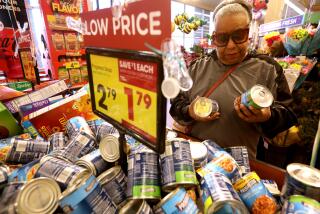Moscow Shoppers Vent Ire Over Food Shortages, Costs
- Share via
MOSCOW — After hoisting up a plastic-wrapped length of Lyubitelskaya sausage--a fat-studded bologna--from the otherwise empty refrigerator case at one of Moscow’s biggest supermarkets, Natasha Ternetseva looked with loathing at her intended dinner.
“We have invited friends over tonight, and this is what I have to offer them,” the 31-year-old irrigation engineer stated, throttling the sausage to emphasize her disgust. “There was a time when it would have been shameful to treat a guest this way. But there is nothing we can do about it.”
Ternetseva vented her wrath over the worsening lot of the Soviet consumer in the middle of the vast, nameless supermarket across from Kievsky train station. Its expanse of bare shelves and open bins Friday was marred by only 23 products for sale, with jars of mashed onions and pureed pumpkin providing the only exotica among salted fish, basic staples and bags of groats, a cereal food.
Food shortages and declining living standards have been a constant theme at the 28th Communist Party Congress, at which delegates are currently debating high-flown formulas for improving the reform drive known as perestroika.
But in a nation where putting the simplest of dinners on the table costs half the family budget and three hours of a working woman’s day, hope for rescue from the ruling powers has been crushed by decades of disappointment.
Although President Mikhail S. Gorbachev and other party leaders have declared that the proposed transition to a market economy will encourage farmers to grow more and Soviet enterprises to deliver it to consumers faster, virtually no one expects anything to change.
Ternetseva snorted derisively when asked what consequences the political gathering would have on the lives of ordinary Soviet people.
“Absolutely nothing can be expected from the congress,” she lamented. “If you ask me, it’s just a fight for power.”
Like most stores in Moscow, the supermarket is posted with warnings that only shoppers with local residence permits will be permitted to buy its meager wares.
The government imposed municipal customs barriers in late May to counter the priyezhayushi --the “arrivals”--a derisive label attached to provincial shoppers who flood to the capital each day by train in search of goods to buy.
Even in Moscow, the stocks at smaller outlets make those at the supermarkets look plentiful. At a fruit and vegetable stand on Sadovo-Samotechnaya Street, only scarred squash and knobs of garlic were for sale.
The state stores’ starvation rations contrast sharply with the relative plenty crowding the counters of flourishing farmers’ markets. Growers charge sky-high prices for fruits and vegetables grown in private plots, adding to the frustration of the average housewife who can ill-afford a day’s pay for a bowl of cherries.
Tomatoes, peppers and cucumbers--all sell for 10 rubles a kilogram, or about $7 per pound. Seasonal fruits such as cherries and peaches range between $9 and $14 per pound, a considerable chunk from the average monthly salary that is about $320 at the official exchange rate.
To make the kind of dinner that Russians consider imperative when guests are invited costs between 70 and 100 rubles, perhaps a third of a month’s pay.
Russians relish their zakuski, an array of introductory snacks that are usually the highlight of any dinner, consumed with healthy quantities of alcohol as the meal that is often an all-night affair gets under way.
Wine is seldom available, thanks to a five-year campaign against drunkenness, which has nevertheless done little to reduce alcoholism, estimated to afflict 60% of Soviet men. The standard dinner for friends or visitors is now crowned by Armenian cognac. That costs $27 and a long search for a store with any liquor to sell.
Even mineral water is hard to find, despite the hundreds of varieties bottled for export, and dairy products are often limited to milk and the runny yogurt known as kefir.
Eggs and cheese are hard to come by, and organ meats such as brains, kidneys and hearts are considered a find.
At a shop on Tsvetnoi Boulevard, a crowd of mostly women packed in to queue for hot dogs, a sought-after luxury for Soviet housewives because of their ease of preparation.
Meat is available in Moscow, but fat and bone make up most of the crude lumps that sit unrefrigerated on butcher tables, the target of flies throughout the day. Ducks and chickens, unwrapped and grimy, lie sprawled on counters with feet and claws still attached.
Summer poses additional worries for Soviet shoppers, who must lug the dubious rewards of their numerous searches and long waits back to unair-conditioned offices and factories where perishables can spoil before the end of the day.
Most women hold down full-time jobs in the Soviet Union, but inflexible tradition saddles them with the brunt of domestic work.
Only about one in 10 families has a car, so the daily hunt for sustenance is a drudgery of lines, heavy bundles and crowded transport.
Women laden with string bags and bulging satchels trundle in bad shoes along broken pavement, skirting puddles from the overnight washing that gets streets and sidewalks wet but never clean.
Waiting until the end of the day to buy groceries is not an option, because the best of what is available is snapped up by the elderly with time to scope out dozens of stores.
“Few women do their shopping these days by going out and seeking specific products,” said Tatiana Baranova, a 40-year-old financial analyst. “You shop by going in to see what there is. That’s what you make for dinner.”
Most nights her family of five dines on potatoes, with meat when available, and subsidized bread to round it out.
Labor lost to the frequent AWOLs has little effect on the overall economy, Baranova said, because waste and inefficiency are the basis for the system.
“Our ministries throw away money and resources, and we just keep track of the details,” she remarked.
Timing the food forays is complicated by the practice of closing stores for an hour at lunchtime.
“Get out! Didn’t you hear the bell?” barked a supermarket stock clerk, physically pushing customers toward the door.
“You have to check before work, during work and after work, because goods arrive at all hours and you have to be there soon or miss out,” said Olga Sinyukova, shopping with her husband and 3-year-old daughter.
At least half the family income is needed for food purchases, said numerous mothers bustling between their jobs and the handful of shops that require a daily visit.
Fresh deliveries spawn immediate lines, which to an outsider look unruly, but proceed under unspoken rules that Soviet shoppers learn at an early age.
Many Soviets have tuned out politics and slipped into resentment of authority, discarding new promises of prosperity as so much bluster that they no longer can believe.
Zoya Li rolls her eyes skyward when asked about the effect of the congress on the struggling economy, a top-level effort to reorient the reform program to restore order and dignity to the people.
“We can’t see any changes from all these years of talk,” lamented the working mother weighing watermelons on a center-city sidewalk. “We hope things will get better, but we have no reason to expect it soon.”
More to Read
Sign up for Essential California
The most important California stories and recommendations in your inbox every morning.
You may occasionally receive promotional content from the Los Angeles Times.











